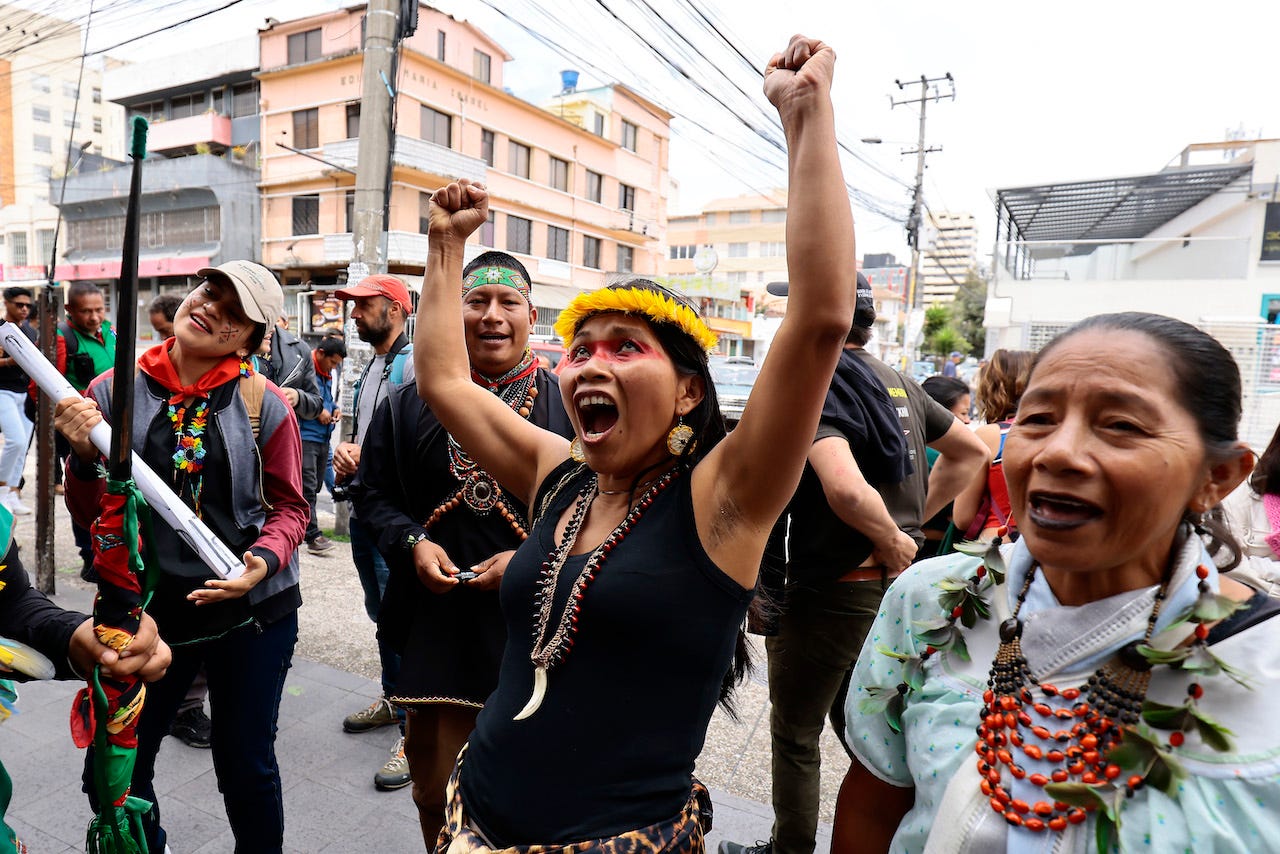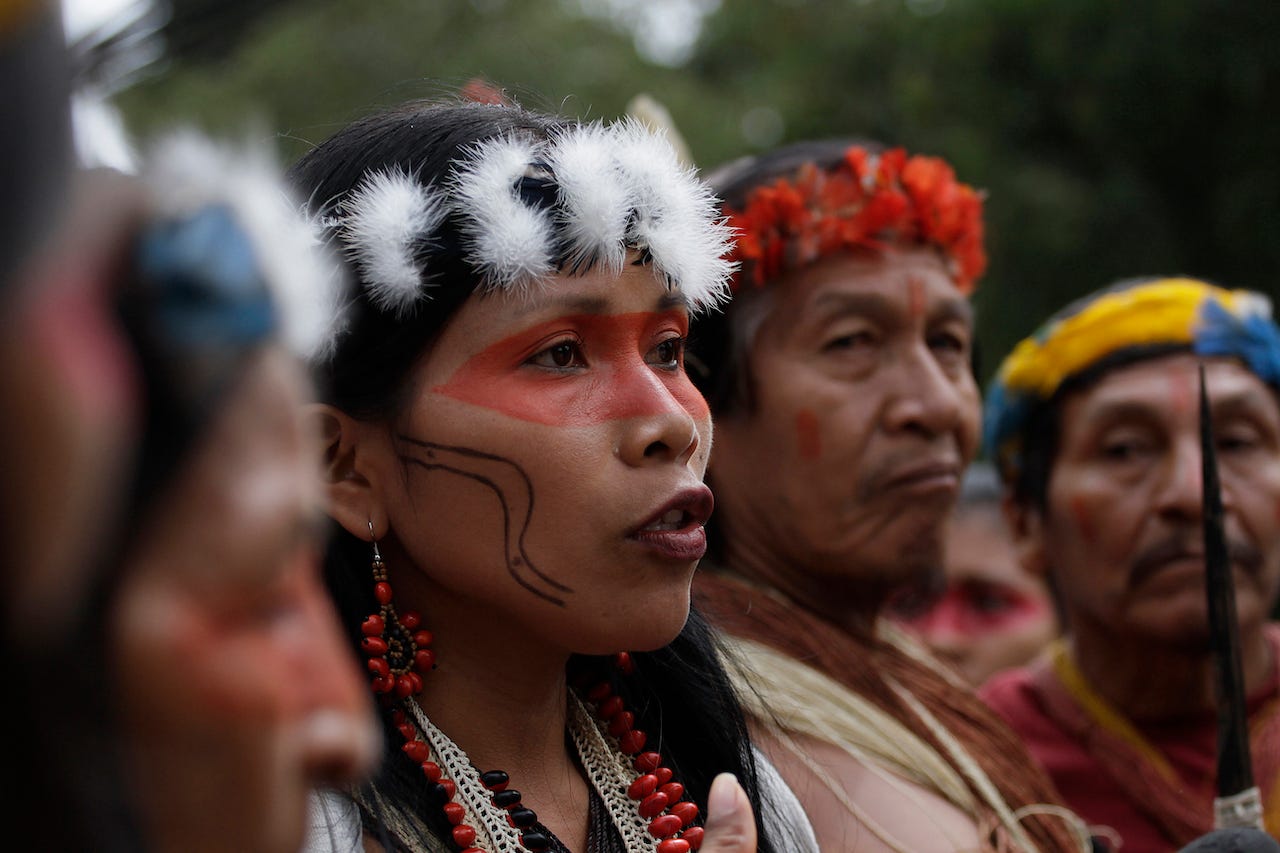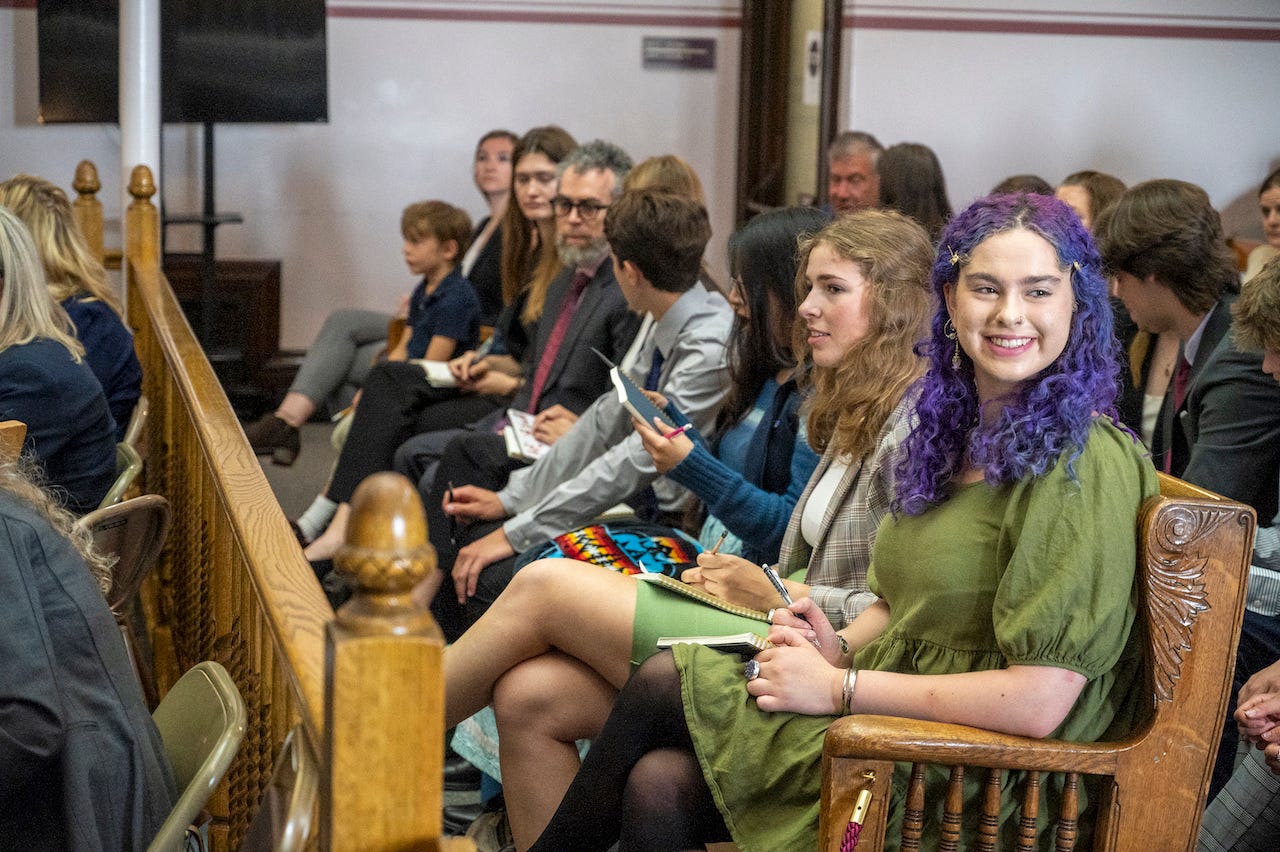HEATED - Yes, climate activism can win
Welcome back to HEATED—Arielle here. Emily and I were dealing with winter sickness this week, but we’re back with some good news for a new year. In other good news, Monday is a holiday, so we’ll see you all next Thursday. And finally, thank you to everyone who entered our HEATED hat raffle! The three winners have now been notified via email. If you want to be able to enter future giveaways, and you have the means, please consider upgrading to a paid subscription. Yes, climate activism can winHere are four different ways activists went about achieving real climate progress in 2023.This week, the scientific agencies of the world announced that 2023 was, by far, the hottest year in human history–and that 2024 may be even worse. For Emily and I, the news served as a bleak reminder that climate accountability journalism has never been more important or necessary. But one thing we’ve been thinking about lately is that there’s more to accountability journalism than exposing the bosses, brokers, and beneficiaries of climate delay. To truly arm readers with the information they need to fight the climate crisis, they also need to hear stories about how powerful interests can be defeated. That’s why, for my first newsletter of the year, I’d like to highlight a few different ways that activists effectively fought climate obstruction around the world in 2023. The list is not intended to be a comprehensive collection of climate wins of last year, nor is it meant to be a look at the oft-described “best” ones. Rather, it’s simply meant to show you a handful of different routes through which actual progress was achieved, to give you a closer look at how it’s done. None of these examples focus on individuals acting alone. That wasn’t on purpose, but it is illustrative of how change happens. Yes, there can be extraordinary individuals who spark a movement. But climate change is a planetary-scale problem. It can only be solved by collective action. The most important thing to remember is that each of the groups listed below are made up of ordinary people, all of whom took small steps that mattered to them. Eventually, over a period of years, they wound up making a big difference. Here are some of the climate change-makers of 2023 – what they accomplished, who they were up against, and how they got it done. The South American activists who knocked on doors to stop drilling in the AmazonLast August, Ecuadorians voted to ban oil drilling in the Amazon, a move that makes Ecuador one of the first countries in the world to democratically decide to curtail fossil fuels. The referendum will protect the Yasuní National Park, one of the most biodiverse regions on Earth and home to the Tagaeri and Taromenane people. It will also keep about 726 million barrels of oil in the ground, according to The Guardian. What they were up against: The country’s national oil company, Petroecuador, which drills on the eastern edge of the Yasuní National Park. The oil project produces more than 57,000 barrels of oil a day, about 12 percent of Ecuador’s oil production. Petroecuador claims its oil wells in the Yasuní have generated $4.2 billion USD from 2014 to 2022. The ratings agency Fitch estimated Ecuador could lose $600 million a year without the oil exports. How they won: Persistence, risk-taking, and good old fashioned door-knocking. Young environmental activists overcame the government’s reluctance to protect the rainforest by knocking on doors and gathering signatures. Yasunidos, a grassroots group formed after former president Rafael Correa reneged on his promise to protect the Amazon, recruited more than 1,400 volunteers to go door-to-door in 2013. The group gathered more than 750,000 signatures in 6 months, well over the amount necessary to trigger a referendum. But Correa’s administration voided half the signatures, prompting Yasunidos to fight in court. After a decade of legal battles, Ecuador’s highest court validated the referendum and it was put to the vote on August 20, 2023. The majority of Ecuadorians voted to ban oil drilling. For Nemonte Nenquimo, an Indigenous Waorani leader and winner of the Goldman prize for the environment, the passage of the referendum was a personal victory. “As a Waorani woman and mother, I feel overjoyed with Ecuadorians’ resounding decision to stop oil drilling in my people’s sacred homeland,” Nenquimo told The Guardian. The government now has about a year and half to halt oil drilling and dismantle its infrastructure in the park. Why this matters: Latin America is the most dangerous area in the world to be an activist, particularly for Indigenous activists. In 2022, 177 environmental activists were killed—88 percent of them in Latin America, according to Global Witness. Despite the risks, Latin American climate activists have made significant progress in the face of governments deeply invested in fossil fuels. This is an example that it’s possible to achieve victory even in the face of danger. The U.K. activists who dove into bureaucracy to crack down on greenwashingIn June, the United Kingdom’s advertising watchdog banned greenwashing fossil fuel ads from Shell, Spanish oil company Repsol, and Malaysian company Petronas, saying the ads were misleading consumers about climate change. The now-banned marketing campaign from Shell had claimed that a large portion of its business was low-carbon energy. But the U.K.’s Advertising Standards Authority (ASA) ruled that the campaign was deceptive, because fossil fuels make up the “vast majority” of Shell’s business. What they were up against: Decades of greenwashing by oil companies with deep pockets like Shell, which made a record $42 billion in 2022. Those billions fund a large team of lawyers, who wrote extensive rebuttals to the ASA complaint—which meant the process took a full year to resolve. How they won: Persistence, protest, and effective use of bureaucracy. The ASA’s decision was thanks to the activism of the Adfree Cities campaign group, a nonprofit made up of a network of local volunteer groups across the U.K. who campaign against corporate advertising. The group’s Bristol chapter first noticed Shell ads posted around their community claiming that "Bristol is ready for cleaner energy." The ads listed the number of homes in the South West of England which used renewable electricity. Adblock Bristol volunteers were skeptical, so they flagged the ads to Adfree Cities headquarters. In formal complaints to the ASA,the group argued that Shell’s ads were deceptive because they left out the fossil fuel giant’s true environmental impact. In contrast to Shell’s vast network, Adfree Cities has only six employees, who spent hours responding to Shell’s rebuttals before the ASA ruled in their favor. The group also utilized public pressure to move the needle and influence ad agencies that work with fossil fuel companies. They staged protests outside Shell’s London ad agencies, including Wunderman Thompson, in order to expose “the absurdity of expanding oil and gas extraction and rampant profiteering in the face of worsening climate impacts,” the group said. Why this matters: “The reason [this] was such a big win is because it sets a precedent,” Veronica Wignall, co-director of Adfree Cities, told HEATED. “It's a chink in the ability of other fossil fuel majors to greenwash in the same way.” And if you’ve been reading HEATED for awhile, you know that greenwashing ads are everywhere, as fossil fuel giants try to purchase a social license to operate. But Adfree Cities has shown that even a small group of volunteers can have a big impact. That’s a big deal, because many other countries have false advertising standards that can be applied to fossil fuel ads. In the U.S., for example, the Federal Trade Commission is reviewing its “Green Guides”, the regulations for environmental claims in advertising. That leaves room for Americans who spot greenwashing ads, and groups like the U.S.-based Clean Creatives, to help ban bogus ads. “We hope that rulings like this do spark copycat moves in other countries to stop greenwashing,” Wignall said. “I don't think we should be tolerating fossil fuel advertising any more, full stop, greenwashing or not.” The U.S. youth activists who used the justice system to topple unjust climate policyIn August, U.S. District Court Judge Kathy Seeley ruled that the state of Montana violated 16 young Americans’ constitutional rights to a “clean and healthful environment” by passing an aggressive anti-climate law that barred the state from considering the climate impacts of potential fossil fuel projects. “I think this is the strongest decision on climate change ever issued by any court,” Michael Gerrard, director of Columbia University’s Sabin Center for Climate Change Law, told HEATED about the case, Held v. Montana. What they were up against: Fossil fuel interests are deeply entrenched in Montana, which is one of the largest oil and gas consumers, and the fifth-largest coal producer in the U.S. The fossil fuel industry has donated millions to state politicians, including about $537,000 to Representative Ryan Zinke and over $1 million to Senator Steve Daines. The state fought to keep the case from coming to trial multiple times, claiming that it was just an “airing of political grievances.” How they won: Persistence, courage, money, and luck. Over the past decade, the activist law firm Our Children’s Trust has filed lawsuits in all 50 states, seeking to hold governments accountable for failing to act on climate change. After many failures, Held v. Montana was their first victory–and they couldn’t have done it without the sixteen young activists who were courageous enough to attach their names and stories to the lawsuit. Of course, the ruling was almost certainly due in part to the state’s own incompetence; the trial featured multiple state officials who were unfamiliar with basic climate science and the world’s leading climate experts. But still, years of work went into the case by the plaintiffs’ lawyers and the plaintiffs themselves. In fact, two of the plaintiffs—the Busse brothers—were also part of a failed 2011 petition filed by Our Children’s Trust asking the Montana Supreme Court to curb greenhouse gas emissions. And of course, no effort like this is possible without money: The nonprofit law firm’s work is supported by donors, and left-leaning grant organizations like the Rockefeller Brothers, Avaaz Foundation, and Libra Foundation. Why this matters: The legal system is one of the most potentially powerful tools to hold the fossil fuel industry and governments accountable for the devastating consequences of unchecked climate change. This lawsuit is just one of many still working their way through the court system, and every win represents a potential path for another lawsuit to succeed. The Massachusetts community members who never gave up on offshore windOn the second day of 2024, a historic milestone for the climate quietly started spinning off the shores of Massachusetts. The nation’s first offshore wind project, Vineyard Wind, produced 5 megawatts of clean electricity for the New England grid in an early test on January 2. When complete, the 800-megawatt wind farm will generate power for 400,000 homes. It will also reduce carbon emissions by more than 1.6 million metric tons per year, equivalent to the emissions from 325,000 cars per year, according to the companies behind the project. What they were up against: It’s hard to underestimate the extent of fossil-funded opposition to offshore wind in the U.S.; it’s a big reason why the U.S. lags so far behind countries like China and Europe in development of the clean energy technology. But to try to put a number on it: A group of students at Brown University calculated that groups with ties to the fossil fuel industry have funneled $72 million into opposing offshore wind on the East Coast since 2017. The Vineyard Wind project was a major target of these groups; for example, as we reported in 2022, a fossil fuel-funded climate denial group filed lawsuits to stop the project because they claimed wind farms harm the environment.” That group also launched a social media effort to promote the lawsuit’s claims. How they won: Persistence, coalition-building, and money. This was a case of a local community successfully fundraising and building support over two decades to overpower fossil fuel-funded opposition to clean energy. The steps were small at first—local architect and renewable energy advocate Kate Warner founded the nonprofit Vineyard Energy Project in 2003, dedicated to educating Martha’s Vineyard about sustainability. That led to the creation of the local co-op Vineyard Power in 2009, which with only two employees planned to raise nearly $200 million in investments in wind power. Other local groups threw their support behind promoting renewable energy—the Vineyard Sustainable Energy Committee was formed in 2017, chaired by local Rob Hannemann, and the Martha’s Vineyard Commission created a climate action plan, spearheaded by local Liz Durkee. Individually, none of these groups could have ensured that Vineyard Wind got built—that required local, state, and federal cooperation. But without this community support, Vineyard Wind would never have happened. That’s clear to activists in the region, because the first offshore wind project proposed in Massachusetts in 2001, Cape Wind, was ultimately canceled after years of expensive legal battles and lack of community support. So this time around, Martha’s Vineyard activists made sure that Vineyard Wind benefited the community, starting with using union workers to construct the project. Rachel Patcher, the chief development officer of Vineyard Wind, told E&E News that the challenges facing the project were daunting—but ultimately, rewarding. “We waited for 20 years to see the alignment of the states and the feds on offshore wind,” she said, “and that’s what we have right now.” Why this matters: With the passage of the Inflation Reduction Act, new large-scale renewable energy projects will be popping up all over the country, and they’ll be facing the same type of moneyed opposition from fossil fuel-connected groups. The Vineyard Wind project shows that it’s possible for committed members of local communities to work together to chip away at that opposition–and, ultimately, win. Got a story of climate change-making in 2023 you want to share that we missed? Let us know in the comments! Catch of the Day: Though we love all animals here at HEATED, we especially love animals who are named after other animals—like Birdie, our first-ever horse. Birdie is only a horse in the technical sense. Spiritually, according to reader Katharine, Birdie is a muffin. And what a dashing muffin he is. Want to see your furry (or non-furry!) friend in HEATED? It might take a little while, but we WILL get to yours eventually! Just send a picture and some words to catchoftheday@heated.world. You're currently a free subscriber to HEATED. For the full experience, upgrade your subscription. |
Older messages
A chemical disaster occurred almost every day in 2023
Friday, January 5, 2024
Petrochemical incidents aren't always as visible as the East Palestine train derailment, but at least 322 happened last year.
Four years of HEATED
Thursday, December 21, 2023
Sure, growth is good. But sustainable growth is even better.
Win a free HEATED hat!
Tuesday, December 19, 2023
Just tell us what you liked this year, and we'll enter you in our raffle for Very Cool and Very Official merch.
On climate deals, beware the word "historic"
Friday, December 15, 2023
It's a trap!
The 12-year-old who halted COP28
Tuesday, December 12, 2023
It is indicative of the world's total systemic failure to slow climate change that a child feels she must do the job of adults.
You Might Also Like
Please Ignore These Popular TikTok Tax 'Hacks'
Saturday, March 1, 2025
Sour Cream Makes a Better Egg Wash Than Eggs. Maybe don't trust tax "loopholes" coming from a content creator. Not displaying correctly? View this newsletter online. TODAY'S FEATURED
⚡ Amazon Lightning Deal! 12 Hours Only! ⚡
Saturday, March 1, 2025
Special Offer From our Friends at Good Housekeeping ⚡ Amazon Lightning Deal! 12 Hours Only! ⚡ View in Browser 28-day mediterranean diet. Alternating images of meals including chicken skewers and cous-
Weekend: Are My Married Friends Being Rude? 😤
Saturday, March 1, 2025
— Check out what we Skimm'd for you today March 1, 2025 Subscribe Read in browser Header Image But first: a cute (and inexpensive) tumbler for your morning coffee Update location or View forecast
Hit the Courts This Spring in Our Favorite Tennis Shoes
Saturday, March 1, 2025
If you have trouble reading this message, view it in a browser. Men's Health The Check Out Welcome to The Check Out, our newsletter that gives you a deeper look at some of our editors' favorite
"I Might Not Be Getting Anything Done, But At Least I'm Not Having Fun"
Saturday, March 1, 2025
Do Americans actually resist pleasure? ͏ ͏ ͏ ͏ ͏ ͏ ͏ ͏ ͏ ͏ ͏ ͏ ͏ ͏ ͏ ͏ ͏ ͏ ͏ ͏ ͏ ͏ ͏ ͏ ͏ ͏ ͏ ͏ ͏ ͏ ͏ ͏ ͏ ͏ ͏ ͏ ͏ ͏ ͏ ͏ ͏ ͏ ͏ ͏ ͏ ͏ ͏ ͏ ͏ ͏ ͏ ͏ ͏ ͏ ͏ ͏ ͏ ͏ ͏ ͏ ͏ ͏ ͏ ͏ ͏ ͏ ͏ ͏ ͏ ͏ ͏ ͏ ͏ ͏ ͏ ͏ ͏ ͏ ͏ ͏ ͏
“Fog” by Emma Lazarus
Saturday, March 1, 2025
Light silken curtain, colorless and soft, / Dreamlike before me floating! ͏ ͏ ͏ ͏ ͏ ͏ ͏ ͏ ͏ ͏ ͏ ͏ ͏ ͏ ͏ ͏ ͏ ͏ ͏ ͏ ͏ ͏ ͏ ͏ ͏ ͏ ͏ ͏ ͏ ͏ ͏ ͏
savourites 96
Saturday, March 1, 2025
escaping the city | abandoning my phone | olive oil ice cream ͏ ͏ ͏ ͏ ͏ ͏ ͏ ͏ ͏ ͏ ͏ ͏ ͏ ͏ ͏ ͏ ͏ ͏ ͏ ͏ ͏ ͏ ͏ ͏ ͏ ͏ ͏ ͏ ͏ ͏ ͏ ͏ ͏ ͏ ͏ ͏ ͏ ͏ ͏ ͏ ͏ ͏ ͏ ͏ ͏ ͏ ͏ ͏ ͏ ͏ ͏ ͏ ͏ ͏ ͏ ͏ ͏ ͏ ͏ ͏ ͏ ͏ ͏ ͏ ͏ ͏ ͏ ͏ ͏ ͏
5-Bullet Friday — How to Choose Peace of Mind Over Productivity, Guinean Beats for Winding Down, Lessons from Legendary Coach Raveling, and a New Chapter from THE NO BOOK
Saturday, March 1, 2025
"Easy, relaxed, breathing always leads to surprise: at how centred we already are, how unhurried we are underneath it all." — David Whyte ͏ ͏ ͏ ͏ ͏ ͏ ͏ ͏ ͏ ͏ ͏ ͏ ͏ ͏ ͏ ͏ ͏ ͏ ͏ ͏ ͏ ͏ ͏ ͏ ͏ ͏ ͏
Nicole Kidman's “Butter Biscuit” Hair Transformation Is A Perfect Color Refresh
Saturday, March 1, 2025
Just in time for spring. The Zoe Report Daily The Zoe Report 2.28.2025 Nicole Kidman's “Butter Biscuit” Hair Transformation Is A Perfect Color Refresh (Celebrity) Nicole Kidman's “Butter
David Beckham's Lifestyle Keeps Him Shredded at 50
Friday, February 28, 2025
View in Browser Men's Health SHOP MVP EXCLUSIVES SUBSCRIBE David Beckham's Lifestyle Keeps Him Shredded at 50 David Beckham's Lifestyle Keeps Him Shredded at 50 The soccer legend opens up





